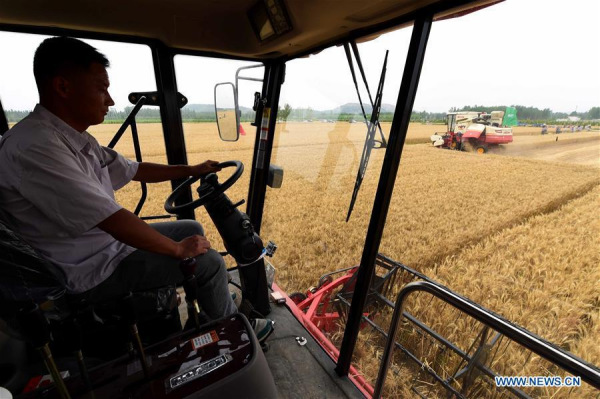
Extreme weather patterns, pests and diseases are impacting food security in China and the world, according to experts at the 7th International Crop Science Congress being hosted in Beijing this week.
Earth's overall temperature rose by about 0.75 C over the last century, according to Zhang Weijian, the chief scientist of agro-ecology at the Chinese Academy of Agricultural Sciences.
The world's agricultural sector is feeling the heat. A 6 percent decline in global wheat production can be expected for every 1 degree rise in the Earth's temperature, said Senthold Asseng, an agricultural engineering professor of agricultural engineering at the University of Florida.
"The amount lost is more than Africa's entire wheat imports," Asseng said.
China experienced a 5.5 percent decrease in wheat production between 1980 and 2008, but global warming's effects may differ based on location and the particular crop, Zhang said.
Rising temperatures can increase yields of winter wheat in northeast China because it reduces frost damage. On the other hand, the single-season rice fields in the south and along the Yangtze River may suffer losses due to flooding, which may be tied to changes in the water cycle, Zhang said.
"As a result, crops like winter wheat and rice are moving north, which requires new seeds and production methods in the new environment," he said.
But crops can't run from extreme climate events. Last year, an estimated 21.8 million hectares of farmland were destroyed by natural disasters, with direct economic losses exceeding 270 billion yuan ($40.8 billion), according to the China National Commission for Disaster Reduction.
"Extreme climate events are one of China's toughest agricultural challenges," said Hu Shuijin, an ecology professor at Nanjing Agricultural University. "Many plantations are at the mercy of the fragile and sensitive ecosystem."
In Jiangsu and Anhui provinces, where temperatures during the rice blossom period have been critically high, the delicate pollination process can be disrupted and seriously damage the yield, Hu said.
Warming also encourages pests and plant diseases. In some regions, winter is no longer cold enough to kill insect larva. When summer comes, pests can migrate to areas that once were too cold to survive.
"This is a big headache for scientists and farmers," said Song Bo, a research supervisor at Liaoning East Asian Seed Co.
Diseases can also worsen as rising temperatures disrupt the water cycle, creating unpredictable rainfall.
"Densely planted crops like corn may experience over-humidity near its stalks and roots, allowing diseases to spread rapidly," he said.
In August, China's Ministry of Agriculture predicted that pests and disease would affect 161 million hectares of autumn crops, a 14.3 percent increase over 2015.
"It is extremely important to adapt or mitigate damage in the face of today's climate challenges," Zhang said.
Breeding new resistant crops, improving production methods, increasing soil fertility and utilizing big data in warning and post-disaster analysis are some ways of ensuring China's food security, he said.


















































